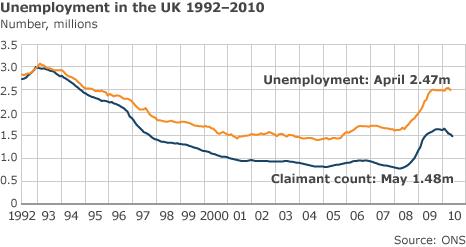UK unemployment increases to 2.47 million
- Published

The number of people unemployed in the UK increased by 23,000 to 2.47 million during the three months to April, official figures have shown.
The unemployment rate was 7.9%, up from 7.8% in the quarter to January.
However, the number of people claiming Jobseeker's Allowance fell in May by 30,900 to 1.48 million, the Office for National Statistics (ONS) said.
And unemployment did fall in some parts of the UK, including Wales, and the north-east of England.
Further, when compared with the figures for the three months to March, overall unemployment has fallen from 2.51 million.
The ONS added that the number of people classed as economically inactive - those out of work and not seeking employment - rose by 29,000 during the three months to April to 8.19 million.
This is the highest level since records began, and represents 21.5% of the working age population.
Youth impact
Employment Minister Chris Grayling said the figures were "a real indicator of the challenge" the government faced.
"What I want to make sure is that we don't make the mistake of the past decade, where we completely failed to get people off benefits and into work at a time when jobs were being created," he said.
"As the economy recovers and as the private sector creates jobs, I want to make sure those jobs do go, as far as they possibly can, to people who are struggling now, who are still on benefits, and who need a better and stronger future."
Prime Minister David Cameron added that while any increase in unemployment was a "tragedy", the figures showed a mixed picture.
The number of people out of work for more than a year increased by 85,000 to 772,000, while unemployment among 16 to 24-year-olds rose by 11,000 to 926,000.
At the same time, the number of people in employment increased by 5,000 to 28.9 million.
Ernst & Young economist Andrew Goodwin said the latest figures were largely "a continuation of recent trends, with another chunky decline in the claimant count, but a more fragile picture when you dig deeper down".
"Looking forward it is difficult to see the unemployment rate coming down very quickly, with little sign that growth in the private sector will be able to offset the impact of public sector cuts," he added.
'Worrying'
John Walker, national chairman of the Federation of Small Businesses (FSB), said the latest rise in unemployment was "worrying".
"The FSB believes that while it is important that the government cuts the deficit - something that over 90% of FSB members agree with - it must not be at the expense of the recovery or mean a hike in taxes for small businesses," he said.
"Small business owners, who already employ over half of the private sector workforce, need encouragement to take on new staff and grow their business in 2010 if they are to do their job in tackling rising unemployment."
'Permanent damage'
Figures released by the ONS also showed that the number of people employed in the public sector increased by 28,000 in the year to the end of March 2010 to total 6.09m.
With the coalition government widely expected to trim public sector employment as part of its major spending cuts, the Chartered Institute of Personnel and Development warned last week that it could push overall UK unemployment past three million.
Labour reiterated its view that now was not the right time for major government spending cuts.
"These figures show why it would be mad to cut support for jobs and the economy right now," said shadow work and pensions minister Yvette Cooper.
"We believe that unemployment is never a price worth paying."
TUC general secretary Brendan Barber also said the latest figures from the ONS showed that substantial spending cuts would be the wrong thing to do.
"The worst possible response would be to slash spending, which will cut demand in the economy and send hundreds of thousands of public and private sector workers on to the dole," he said.
"Deep cuts now could permanently damage the prospects for the one million young people out of work who are struggling to get their careers off the ground."